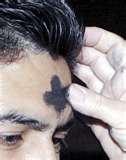How Losing My Virgin-ity Strengthened My Faith
/With Ash Wednesday fast approaching, I find myself reflecting upon my church upbringing. You see, I was raised Catholic in Oklahoma. Until Guatemala, it’s the closest I ever came to feeling like a minority. For every Catholic in the sooner state, there are roughly five Baptists. If religion were a basketball team in Oklahoma, Catholic would be the assistant trainer, taping ankles with rosary beads and working out sore muscles with a chrism oil rub down.
In fact, you are twice as likely to find someone calling themselves “non-religious” as you are to find a Catholic in Oklahoma. And this is in a state that has seen its share of God-fearing moments. Just think of it. The Trail of Tears. Check. The Dust Bowl. Check. The Oklahoma City Bombing. Double-check. Still, even those claiming no faith at all outnumber the Catholics.
Because of this, I got used to feeling a bit outcast growing up. Tested in my faith. There were certainly peaks and valleys for this malaise. The whole Lenten season leading up to Easter was perhaps the grandest of the peaks.
I clearly remember a trip to the grocery store on Ash Wednesday when I was eight years old. I was perusing the cereal aisle, drooling over Cookie Crisp and Fruity Pebbles. Unfortunately, the only cereals we were allowed to have in my house were those that resembled the floor sweepings from a cabinet shop. Nutritious. Full of fiber. Tasteless. As I reached for a box of Frosted Mini Wheats, I was trying to think of a way to lure mom to the dark, sugary side of breakfast. Right then a woman approached me and tried to wipe the “smudge” off my forehead.
“Herman, I think this kid’s been playing in the barbecue pit?”
Rather than explain the ritual, which I really didn’t understand anyway, I acted like I had to pee and quickly walked away.
And then there were Lenten Fridays. If you’re Catholic, this meant no meat. Early on in my grade school career, the school system gave an honorary nod to Catholics and made every Friday a “fish stick day.” Unfortunately, by third or fourth grade, that policy was withdrawn and I was considered a lunatic for trading my Little Smokies for an extra helping of green beans. This did, however, create an enormous amount of good will which I cashed in for choice seats on the bus. In retrospect, many of the meat items in school cafeterias today would technically qualify as “soy slurry pressed and formed into meat-like shapes.” I digress.
Don’t get me wrong, I love the Catholic religion. I’m not a practicing Catholic today, but I still catch myself making the sign of the cross after a prayer - especially when approaching a truly monumental situation. My wedding. The birth of my two children. Preparing to grill a slab of baby back ribs.
I find the tradition and ritual of the Catholic faith to be a beautiful thing. The smell of incense makes me nostalgic. Gregorian chants calm my soul. All of the pomp and circumstance surrounding the communion table fascinates me. A priest teaching a Jesus 101 workshop back in college told me and a few other trivia-seeking Catholics that during communion, the bread and the wine actually become Jesus body and blood. So much so, that it cannot be thrown away. It must be consumed. He recounted a story of church protestors, angry with something the Pope had done, coming forward to receive the bread and wine, and then spitting it out right there at the altar.
In response, he simply knelt down, picked up the remnants, put them in his mouth and swallowed them.
There are two key takeaways here. First, this ritual and tradition holds deep meaning in the Catholic church. Second, if you’re thinking of becoming a Catholic priest, read the job description very carefully. There are more than few “gotcha’s.”
Upholding the rich tradition of Catholics never doing anything half-way, fifty scholars, translators, linguistic experts, theologians and five bishops have spent the past 17 years revising the New American Bible, the text owned by U.S. Catholic bishops for prayer and study. Tomorrow, Ash Wednesday, a new edition of the Bible is coming out. My guess is that you probably haven’t pre-ordered a copy at your local Barnes and Noble. If you’re looking to update your library, you may want to make note.
The last edition was published in 1970, but there has been some significant research done since then, and the Catholics, wanting to stay current, have been poring over original manuscripts, the Dead Sea Scrolls, and archeological findings. Sounds like quite an undertaking to me. Their goal was to improve the accuracy and accessibility of the Bible. So, based on the most recent information available, they have made some changes.
For instance, the previous version contains the word “booty,” which refers to treasure. Noting that “booty” in today’s vernacular conjures up images of Jennifer Lopez’s abundant backside, they have now changed all references to “plunder” or “spoils of war.” Also gone are the giggles from every kids’ Sunday school class. Look for another revised version after Sir-Mix-A-Lot comes out with their comeback album titled, “I Like Big Plunders.”
Also changed is Proverbs 31:10. The passage used to be titled “The Ideal Wife.” Now, it’s called a “Poem on the Woman of Worth.” This change was made so women everywhere could see the Bible reflect the fact that they are measured on their own merits, rather than the perspective of their husbands. I think Gabby will like that one. I frequently tell her what an “ideal wife” should look like, and she promises to fulfill that role when I can take up the mantle of “ideal husband.” This is highly unlikely to happen unless I can overcome my fear of rodents, and stop shrieking like a child when I accidentally walk through spider webs.
I’m not sure how you feel about all of this, but I’m OK with it. Updating the Bible to reflect the times in which we live. Personally, I encourage it. Language is constantly evolving. The original Bible was written in Hebrew and Greek, and arguably in the vernacular of the day. One the people could best understand. So, it stands to reason that we take a fresh look from time to time to assure that the original intent of the passages matches the words we now use to describe it. But the biggest change in the 2011 edition has nothing to do with making the language up-to-date.
It has to do with accuracy.
And it’s a biggie. Hold on to your Papal Tiara!
Isaiah was a prophet. The great forecaster. The predictor. In today’s words, we Christians might call him the Al Roker of the Bible. In Isaiah 7:14, he writes “the virgin shall be with child, and bear a son, and shall name him Immanuel.” We Christians point to this scripture as proof that folks knew Jesus was on the way. It foreshadows the coming of Christ. A once in a kabillion kind of miracle. Tough to miss. Spotting Jesus’ birth to a virgin mother is like spotting me as the only caucasian member of the University of Tulsa Gospel Chorus back in college. I was always the one swaying in the wrong direction. There’s no denying it.
But in the latest edition of the New American Bible, the Isaiah passage has been rewritten. It now reads:
“the young woman shall be with child…”
Young woman?
A footnote in the new Bible provides a bit of clarity. The Hebrew word "almah" which translates into English to mean "maiden" was later translated into the Greek word parthénos which translates simply as "virgin". So, scholars say “almah” may, or may not, signify a virgin. The research is inconclusive.
Wow.
Is this an important detail to anyone else? Seems like a big one to me. Isaiah predicting a young woman giving birth is like Al Roker predicting that it might rain, somewhere in the United States, sometime this week. Kinda’ takes the “oomph” out of the prophesy if you ask me.
What is most significant to me is that the people who are responsible for this revision are the ones who have a vested interest in maintaining the status quo. Why would the bishops and Biblical scholars want to change something that might cause their flock to doubt what some see as a foundation of the Christian faith? It seems like it would have been easy to let “almah” lie for another forty years. Take it up in the next revision. But they chose to do it now. Make the change. With conviction.
I’m left with a couple of potential responses.
I could fight it. I could argue that the scholars are mistaken. They don’t know what they’re talking about. I could look for alterative translations. I could even deny it. Heck. Even if they are correct, that doesn’t mean that Mary wasn’t a virgin. It just means Isaiah wasn’t very detail-oriented. The kind of guy who would forget your birthday.
But that’s the reaction of a defensive faith. A faith that takes the Word at face value. And defending the Word in such a way would mean I would still be making burnt offerings, swearing off shellfish, and owning slaves. It’s a scared, stagnant faith without room for growth.
Or, I could embrace the change. I could question. I could doubt. I could wrestle with the faith that has sustained me for years. I could use this doubt to spur me to an even deeper knowledge. An even deeper understanding. Go on the offensive. Ultimately arriving at the point where I know I can never know it all. Still being happy in that space. For it is a space where faith is alive. Where the Word moves and changes and transforms.
With all of the options before me, I think I’ll choose Door #2. I’ll let the Living Word live. Let it move and breathe. Let it be part of a conversation rather than a passive voice. It’s risky and confusing and hard to grasp. But I think that’s what the Catholics intended. Indeed, what God intended.
For a faith untested is really no faith at all.


